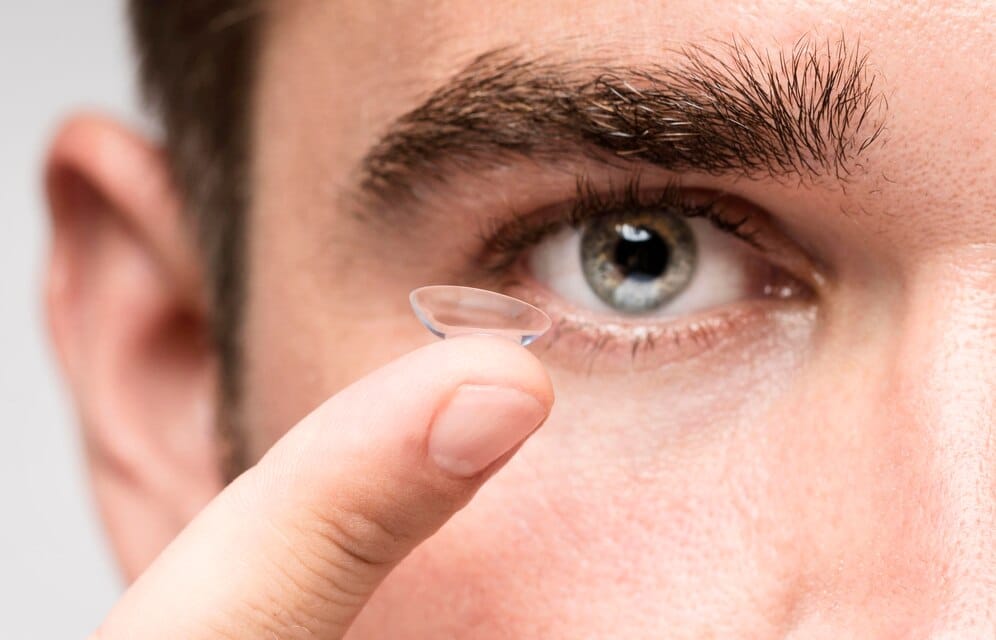contact lens safety,Eye Health

Are you considering switching to contact lenses or looking to improve your current eye care routine? Contact lenses are a popular and effective way to correct vision problems without the need for eyeglasses. In this comprehensive guide, we’ll cover everything you need to know about contact lenses, including their benefits, types, and how to choose the best one for your needs.
What are Contact Lenses?
Contact lenses are small, thin, curved discs made from various materials that sit directly on the surface of your eye. These lenses help correct vision by refracting light to allow for clear sight. Contact lenses offer an excellent alternative to traditional eyeglasses and are available in several types to suit different eye conditions and lifestyles.
Types of Contact Lenses:
- Soft Contact Lenses – The most common type of lenses, made from flexible materials that allow oxygen to reach the eye, providing comfort and breathability.
- Rigid Gas Permeable (RGP) Lenses – Harder than soft lenses but provide sharper vision and are more durable.
- Toric Lenses – Designed for individuals with astigmatism, these lenses have different powers in different parts of the lens to correct uneven curvature.
- Multifocal and Bifocal Lenses – Ideal for those with presbyopia, these lenses provide clear vision at multiple distances (near and far).
- Scleral Lenses – Larger in diameter than traditional lenses, scleral lenses are used for people with severe dry eyes or irregular corneas.
Benefits of Contact Lenses
Contact lenses offer numerous advantages over traditional glasses, making them a popular choice for millions of people worldwide.
- Clearer Vision: Contact lenses provide a wider field of vision compared to glasses. They move with your eyes, reducing the chances of distortion or obstructions from frames.
- Aesthetic Appeal: Unlike glasses, contact lenses are invisible, allowing you to maintain a natural look while improving your vision.
- Enhanced Comfort: Soft contact lenses, in particular, conform to the shape of your eye, offering comfort throughout the day.
- Convenience for Active Lifestyles: Contact lenses are perfect for those who play sports, as they stay in place, don’t fog up, and won’t get splattered with rain or dirt like glasses.
- Freedom from Eyewear: With contact lenses, you don’t have to worry about the limitations of wearing glasses, such as fogging, slipping, or being restricted to a particular style.
Proper Care of Contact Lenses
Taking good care of your contact lenses is essential to prevent infections and ensure that they last longer. Here are some vital tips for proper contact lens hygiene:
- Wash Your Hands: Always wash and dry your hands thoroughly before touching your contact lenses to avoid transferring bacteria and dirt.
- Use Fresh Solution: Never reuse old contact lens solution, as this can lead to bacteria growth and eye infections.
- Clean and Store Lenses: After removing your lenses, clean them with the appropriate solution and store them in a clean lens case to prevent contamination.
- Follow the Wearing Schedule: Whether your lenses are daily, bi-weekly, or monthly, stick to the recommended schedule for replacing your lenses to prevent eye discomfort and possible damage.
- Never Sleep in Your Lenses: Unless they are specifically designed for overnight wear, removing your lenses while sleeping gives your eyes a break and reduces the risk of eye infections.
Common Risks and Side effects of Contact Lenses
Although contact lenses are generally safe, improper care can lead to certain eye problems. Be mindful of these risks:
- Dry Eyes: Prolonged contact lens wear can lead to dry eyes, particularly in dry or air-conditioned environments.
- Infections: Poor hygiene or wearing lenses for too long can lead to eye infections like conjunctivitis or keratitis.
- Corneal Damage: Overuse of contact lenses or not removing them on time can cause damage to the cornea, leading to discomfort or even scarring.
- Allergic Reactions: Some people may experience allergic reactions to the materials in their lenses or the solutions used for cleaning.
Conclusion
Contact lenses offer a fantastic way to correct vision while enjoying more freedom and flexibility than glasses. By selecting the right type of lens, ensuring proper care, and following Center for Excellence in Eye Care professional’s advice, you can experience the full benefits of contact lenses. Whether you’re interested in enhancing your appearance, enjoying better comfort, or improving your performance in sports, contact lenses can help you see clearly and comfortably every day.
Important Tip: Always consult with an optometrist or ophthalmologist at Center for Excellence in Eye Care before switching to contact lenses to ensure the best fit and prescription for your eyes.
By understanding the different types of lenses, the benefits they offer, and how to properly care for them, you can confidently incorporate contact lenses into your lifestyle and enjoy clear, healthy vision for years to come.

